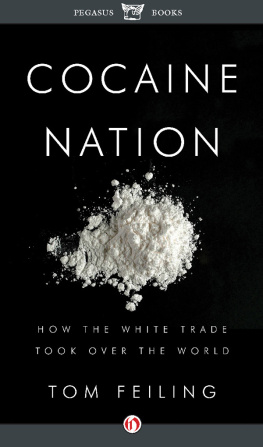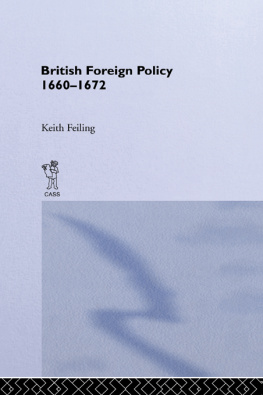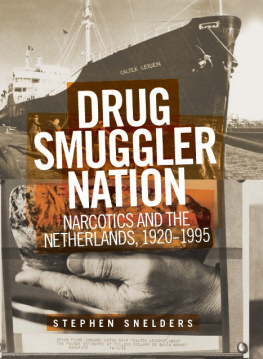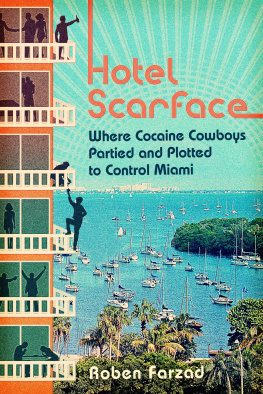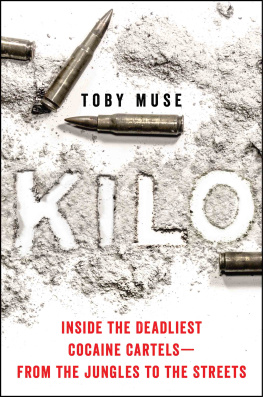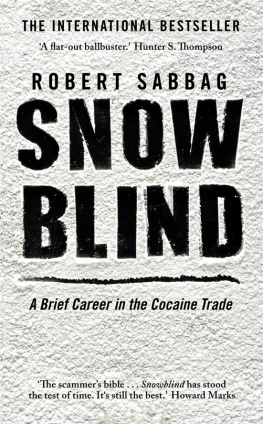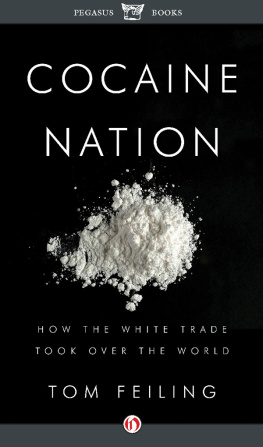COCAINE NATION
HOW THE WHITE TRADE TOOK OVER THE WORLD
TOM FEILING

PEGASUS BOOKS
NEW YORK
All rights reserved under International and Pan-American Copyright Conventions. By payment of the required fees, you have been granted the non-exclusive, non-transferable right to access and read the text of this ebook onscreen. No part of this text may be reproduced, transmitted, downloaded, decompiled, reverse engineered, or stored in or introduced into any information storage and retrieval system, in any form or by any means, whether electronic or mechanical, now known or hereinafter invented, without the express written permission of the publisher.
copyright 2009 by Tom Feiling
ISBN: 978-1-4532-1779-5
Pegasus Books LLC
80 Broad Street, 5th Floor
New York, NY 10004
This 2011 edition distributed by Open Road Integrated Media
180 Varick Street
New York, NY 10014
www.openroadmedia.com

In the UK, Id like to thank Julia Vellacott and Becky Swift for their advice when I first started looking for a publisher. Thanks too to my agent Broo Doherty and my editor at Allen Lane, Margaret Bluman, for taking a chance on a first-time writer. Sir Keith Morris, Danny Kushlick and Axel Klein are critics of the current handling of the cocaine trade. They made me aware of the main players in the debate, and I am grateful for the encouragement they gave me when I was in the early stages of researching this book.
Liam Craig Best of Justice for Colombia and Jenny Pearce of Bradford University advised me on who best to approach in Colombia. In the United States, the experience and analysis of John Walsh at the Washington Office on Latin America, Sanho Tree at the Institute for Policy Studies, and Adam Isaacson at the Center for International Policy were invaluable. In Bogot, my friends Nick Perkins, Rusty Young and Ricardo Sanchez helped me a great deal with my research. Tiziana Laudato and Angelica Ibarra helped with translations. Journalists and film-makers Franoise Nieto Fong, Ricardo Restrepo, Daniel Coronell, Steve Ambrus, Romeo Langlois, Pascale Mariani and Carlos Lozano all had interesting things to say about the drugs trade in Colombia, and supplied me with plentiful leads. Id especially like to thank the many people who agreed to meet and discuss the subject with me, especially since many of them will not share my methods or conclusions: Aldo Lale-Demoz, Rodolfo Llinas and Hugo Javier Bustos at the UNODC (United Nations Office on Drugs and Crime); Juan Carlos Montero at DIRAN (Colombian Anti-Narcotics Police); Carlos Medina at the Observatorio de Drogas of the Direccin Nacional de Estupefacientes; Nick Eliades in the DEA (Drug Enforcement Administration) Public Affairs Office; Than Christie in the Narcotics Affairs Section of the US Embassy; Luis Lucho Salamanca, Kevin Higgins, Chris Feistl, Colombian Vice-President Francisco Santos, Malcolm Deas of Oxford University and David Hutchinson. My thanks, too, go to Dan Scott-Lea, Yaneth Pachn, David Curtidor, Daniel Maestre, Adelaida Moreno at the farmworkers union Fensuagro, Congressman Luis Fernando Almario Rojas, Congressman Wilson Borja, Alberto Rueda, Markus Schultze-Kraft at the International Crisis Group, Ricardo Vargas at Accin Andina, Gustavo Duncan, Luis Eduardo Cellis Mendez at the Fundacin Nuevo Arco Iris, and Omar Gutierrez at the Centre for Investigation and Popular Education (CINEP).
In Jamaica, Id like to thank Geraldine OCallaghan and Andy MacLean for letting me stay with them while I was on the island. Marta Shaw, Flip Fraser, Sarah Manley, Lois Grant and Paul Burke gave me plentiful insights and pointed me in the right direction. Thanks also to local law enforcement officers Inspector Michael Simpson, ACP Carl Williams and Carlton Wilson; and to the British police officers working in Jamaica as part of Operation Kingfish: Les Green, Paul Robinson and John McLean. Im particularly grateful to journalists Anthony Barrett, Glenroy Sinclair and Mark Wignall, and to Bobby Sephestine and Olga Heaven at the prison charity Hibiscus. Lloyd Evans and Gordon Brown helped me to better understand the political situation. Id also like to thank Barry Chevannes, Horace Levy and Donna Hope at the University of the West Indies at Mona.
In the United States, Id like to extend my thanks to Marcela Guerrero for help in finding places to stay in various cities, and to Chris Robinson, David Russell, Carlos Tovar and Neerav Kingsland for putting me up as I travelled from city to city. Bruce Johnson, Doris Randolph, the late Dr John Morgan, Elizabeth Mendez Berry, Kym Clark, Larry Miller, James Peterson, Mark Mauer at the Sentencing Project, Clarence Lusane, Professor Peter Reuter and Steven Robertson at the DEA Public Information Office allowed me to pick their brains. The US chapters owe a great deal to ethnographies of drug users and dealers written by John M. Hagedorn, Rick Curtis, Travis Wendell and Philippe Bourgois. My special thanks to all of them. Alex Sanchez of Homies Unidos, Luis Rodriguez, Jeff Chang, Father Tom Hereford and Bruce George all shed precious light on the cocaine economy. Ethan Nadelmann, Tony Newman, Ed Kirtz, Gabriel Sayegh, Tony Papa and Margaret Dooley-Sammuli at the Drug Policy Alliance were supportive and helpful. Rusty White, Jack Cole, Celerino Castillo III, David Doderidge, and Russ Jones of Law Enforcement Against Prohibition provided an invaluable critique of the war on drugs from the point of view of those who have prosecuted it, as did Judge James Gray, Kurt Schmoke and Eric Sterling. My thanks also to Jon Veit, David Lewis, Julienne Gage, John Maass, Samuel Wilcher and Jacob Sullum at Reason magazine. Tom Horvath of Practical Recovery Services, Susan Burton of the A New Way of Life re-entry project, Marqueece Harris Dawson of the Community Coalition, Lou Martinez at The Effort Community Health Center and Kenny Glasgow of the Ordinary People Society work with compulsive drug users. The conversations I had with them improved my understanding of addiction and social deprivation in the United States.
For help in investigating cross-border smuggling and the drugs trade in Mexico, Id like to thank Elijah Wald, Jon Forrest Little, David Fry and Leticia Zamarripa at El Paso Immigration and Customs Enforcement, Sam Quiones, Rafael Nunez, Jaime Hervella, Howard Campbell, Tony Payan, Richard Cockett, John Dickie, Sam Logan, Dudley Althaus and Jorge Chabat. For insights into the street drug culture of Mexico City, Benito Azcano Roldn, Alfonso Hernandez at the Centro de Estudios Tepiteos, Carlos Zamudio, Ricardo Sala and Mister Hunter deserve special mention.
Id like to thank friends who helped me out in one way or another in the writing of the book: Lauren Ferreira, Erin Howley, Mike Sadler and Anna Wilkinson, Chris Walker and Jordan Ethe in the United States. In Mexico, that means Elizabeth Clark, Danielle Savage, Ed Peterson and Jonathan Barbieri, who all helped to make breaks from the writing process more enjoyable. Back in London, when I wondered how to turn such a welter of information into a good read, Sharon Kinsella, Slawek Dorosz, Daniel Wilson, Bryony Morrison, Sam Low, Richard Garner and Michael Ryan offered valuable feedback on early drafts. Maribel Lozano and Nelson Diaz helped with translations and kept Colombia on my mind. Finally, Id especially like to thank four writers whose insights into the drugs issue most inspired me: Harry Levine, Anthony Henman, Alonso Salazar and Francisco Thoumi.
Unless otherwise indicated, the Colombian interviews were conducted in September 2007, the Jamaican interviews in October 2007, the American interviews in November and December 2007, and the British interviews in May 2008. I would like to thank all the interviewees, particularly those who have chosen to remain anonymous, for investing their time and trust in me.

